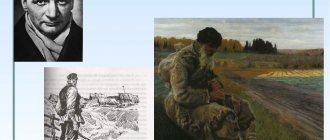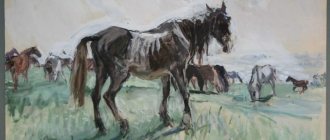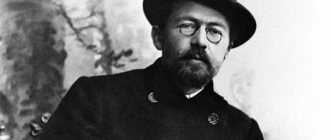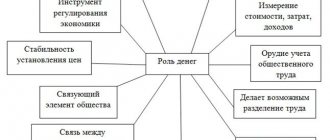Literary works for the final essay 2021-2022
SHARE
The best list of literary works to prepare for the final December essay of the 2021-2022 academic year in literature for admission to the Unified State Exam 2022.
Link to download the list of references:
Arguments for directions:
- Arguments for the direction “Who can live well in Rus'?
- Arguments for the direction “The Traveling Man: The Road in Human Life”
- Arguments for the direction of civilization and technology - salvation, challenge or tragedy?
Literature for the direction of the final essay: a man traveling: the road in a person’s life
- A.N. Radishchev “Journey from St. Petersburg to Moscow”
- A.S. Griboyedov "Woe from Wit"
- A.S. Pushkin “The Station Agent”, “The Captain’s Daughter”, “Blizzard”
- M.Yu. Lermontov “Hero of Our Time”, “Mtsyri”
- N.V. Gogol “Dead Souls”, “The Inspector General”
- ON THE. Nekrasov “Who Lives Well in Rus'”, “Railway”
- A.P. Chekhov "Sakhalin Island"
- L.N. Tolstoy "War and Peace", "Anna Karenina"
- B.L. Pasternak "Doctor Zhivago"
- F.M. Dostoevsky "Crime and Punishment"
- M. Gorky “Foma Gordeev”, “At the Depths”, trilogy “Childhood. In people. My Universities", "Old Woman Izergil"
- I.A. Goncharov “Oblomov”, “Pallada”
- I.S. Turgenev "Notes of a Hunter"
- N.S. Leskov “Lefty”, “Enchanted Wanderer”
- I.A. Bunin "Mr. from San Francisco", "Sunstroke"
- N.M. Karamzin “Letters of a Russian Traveler”
- M.A. Sholokhov “Quiet Don”, “The Fate of Man”
- M.A. Bulgakov "The Master and Margarita"
- A.T. Tvardovsky "Vasily Terkin"
- V.G. Korolenko “The Blind Musician”
- C.T. Ay, “And the day lasts longer than a century”
- V.A. Obruchev “Sannikov’s Land”
- VC. Arsenyev "Dersu Uzala"
- I. Ilf and E. Petrov “Twelve Chairs”, “One-Storey America”
- D.S. Likhachev “Paths of Good”, “Letters about the Good and Beautiful”: “Travel” (letter 29)
- MM. Prishvin "Journey"
- A.P. Platonov "The Driver's Wife"
- V.A. Kaverin "Two Captains"
- K. Bulychev cycle “Alice’s Adventures”
- A. Green “Scarlet Sails”
- N.N. Miklouho-Maclay “Travel”
- Homer "Odyssey", "Iliad"
- A. Dante “The Divine Comedy”
- F. Rabelais "Gargantua and Pantagruel"
- D. Defoe "Robinson Crusoe"
- J. Kerouac "On the Road"
- O. Henry "The Roads We Take"
- J. Tolkien trilogy "The Lord of the Rings"
- A. de Saint-Exupéry “The Little Prince”
- C. Lewis book series “The Chronicles of Narnia”
- L. Carroll "Alice in Wonderland"
- J. Verne “Around the World in 80 Days”, “Children of Captain Grant”, “Journey to the Center of the Earth”
- F. Cooper "Pathfinder", "On Land and Sea"
- J. Durrell (any work, for example, "My Family and Other Animals")
- J. London “Martin Eden”, “The Sea Wolf”, “The Road”, “Hearts of Three” and many others.
- J. Barry series "Peter Pan"
- J. Swift "Gulliver's Travels"
- M. Cervantes "Don Quixote"
- W. Thackeray "Vanity Fair"
- Charles Dickens “A Christmas Carol”, “Great Expectations”
- W. Groom "Forrest Gump"
- D. Mitchell "Cloud Atlas"
- R. Bach “Jonathan Livingston Seagull”
Literature for the direction of the final essay: civilization and technology - salvation, challenge or tragedy?
- M.A. Bulgakov “Fatal Eggs”, “Heart of a Dog”
- N. Nosov “Dunno in the Sunny City”
- V.P. Astafiev "Tsar Fish"
- E.I. Zamyatin "We"
- I.A. Efremov "Andromeda Nebula", "The Razor's Edge"
- T.N. Fat "Kys"
- C.T. Ay
- IN. Pelevin “Generation “P””
- A. and B. Strugatsky “It’s hard to be a god”, “Roadside Picnic”, “Noon, XXII century”
- A. Azimov “Positronic Man”, cycle “Foundation”
- Liu Cixin trilogy “In memory of the past of the Earth”
- G. Kasparov “Man and Computer”
- A.R. Belyaev “Amphibian Man”, “The Head of Professor Dowell”
- O. Huxley “Brave New World”
- R. Bradbury “Fahrenheit 451”, “The Martian Chronicles”, “Farewell Summer”, “A Sound of Thunder”, “All Summer in One Day”, etc.
- K. Vonnegut "Cat's Cradle"
- S. Lem "Solaris"
- J. Orwell "1984"
- K. Ishiguro “Don’t Let Me Go”
- E. Weyer "The Martian"
- D. Keyes "Flowers for Algernon"
- V. Roth "Divergent"
- F. Dick “Do Androids Dream of Electric Sheep”, “Ubik”
- Y. Harari “21 lessons for the 21st century”
- T. Chan "The Story of Your Life"
- J. Dashner "The Maze Runner"
- O.S. Card "Ender's Game"
- S. Collins "The Hunger Games"
- D. Mitchell "Cloud Atlas"
- J. Verne “20,000 Leagues Under the Sea”
- G. Wells "The Time Machine"
- M. Shelley "Frankenstein, or the Modern Prometheus"
- R. Stevenson "The Strange Case of Dr. Jekyll and Mr. Hyde"
Literature for the direction of the final essay Crime and Punishment - an eternal topic
- 1. A. Dumas “The Count of Monte Cristo”
- 2. A. Camus “The Stranger”
- 3. A. Christie “Murder on the Orient Express”
- 4. A. Ostrovsky “Thunderstorm”
- 5. A.A. Akhmatova "Requiem"
- 6. A.A. Block "Twelve"
- 7. A.V. Ivanov "Tobol"
- 8. A.I. Kuprin “Garnet Bracelet”
- 9. A.I. Solzhenitsyn "GULAG Archipelago"
- 10. A.I. Solzhenitsyn "In the First Circle"
- 11. A.M. Adamovich, D.A. Granin "Siege Book"
- 12. A.N. Ostrovsky "Thunderstorm"
- 13. A.N. Ostrovsky "Our people - let's be numbered"
- 14. A.N. Tolstoy "Peter I"
- 15. A.P. Platonov "Chevengur"
- 16. A.P. Chekhov "The Intruder"
- 17. A.S. Pushkin “Two feelings are wonderfully close to us”
- 18. A.S. Pushkin "The Captain's Daughter"
- 19. A.S. Pushkin "The Bronze Horseman"
- 20. A.S. Pushkin "Monument"
- 21. A.T. Tvardovsky "Vasily Terkin"
- 22. A.T. Tvardovsky “By right of memory”
- 26. B.L. Vasiliev “Tomorrow there was a war”
- 27. B.L. Vasiliev “Don’t shoot white swans”
- 28. B.N. Field "The Tale of a Real Man"
- 29. V. Bykov “Obelisk”.
- 30. V. Hugo “Les Miserables”
- 31. V. Hugo “Notre Dame Cathedral”
- 32. V.A. Zhukovsky "Singer in the camp of Russian warriors"
- 33. V.A. Kaverin "Two Captains"
- 34. V.A. Kaverin “Open Book”
- 35. V.A. Chivilikhin “Memory”
- 36. V.V. Bykov "Obelisk"
- 37. V.G. Rasputin "Farewell to Matera"
- 38. V.G. Yang "Genghis Khan. Batu. To the last sea"
- 39. V.D. Dudintsev “White clothes”
- 40. V.I. Aksenov “Mysterious Passion”
- 41. V.K. Arsenyev "Dersu Uzala"
- 42. V.P. Astafiev "Tsar Fish"
- 43. V.P. Kataev “The Grass of Oblivion”
- 44. V.P. Nekrasov “In the trenches of Stalingrad”
- 45. V.S. Grossman “Life and Fate” “Mother”
- 46. V.T. Shalamov “Kolyma Tales”
- 47. Guy de Maupassant “Donut”
- 48. D. Mitchell “Cloud Atlas”
- 52. J. London “Martin Eden”
- 53. J. Orwell "1984"
- 54. I. Stone “Thirst for Life”
- 55. I. Turgenev “Mumu”
- 56. I.A. Brodsky “Dedicated to the Chair”
- 57. I.S. Turgenev "Fathers and Sons"
- 58. I.S. Shmelev “How I met Chekhov. For crucian carp"
- 59. K. Bulychev “City without memory”
- 60. L. Andreev “Judas Iscariot”
- 61. L. Andreeva “Theft was coming”
- 62. L. Lowry “The Giver”
- 63. L. Panteleev, G. Belykh “Republic of SHKID”
- 64. L.N. Andreev “The Tale of the Seven Hanged Men”
- 65. L.N. Tolstoy "War and Peace"
- 66. M.A. Bulgakov "The White Guard"
- 67. M.A. Bulgakov "The Master and Margarita"
- 68. M.A. Sholokhov “Virgin Soil Upturned”
- 69. M.A. Sholokhov "Mole"
- 70. M.A. Sholokhov "Quiet Don"
- 71. M.E. Saltykov-Shchedrin “Lord Golovlevs”
- 72. M.Yu. Lermontov "Borodino"
- 73. M.Yu. Lermontov "Death of a Poet"
- 74. N. Leskov “Lady Macbeth of Mtsensk District”
Literature for the direction of the final essay book (music, play, film) - about me
- A.S. Pushkin “On Art”, “Mozart and Salieri”
- M.I. Tsvetaeva “About Art”
- M.Yu. Lermontov: Creative heritage and modern theater culture
- V.G. Korolenko “The Blind Musician”
- B.L. Pasternak "Doctor Zhivago"
- M.A. Bulgakov "The Master and Margarita"
- A.I. Kuprin "Gambrinus"
- K.G. Paustovsky “Golden Rose”
- N.V. Gogol "Portrait"
- A.P. Chekhov "Rothschild's Violin"
- L.N. Tolstoy "Albert"
- M.A. Osorgin "Notes of an old book-eater"
- YES. Granin "Painting"
- V.V. Nabokov "The Gift"
- M. Gorky trilogy “Childhood”, “In People”, “My Universities”
- D. Bykov “Soviet literature”
- Z. Prilepin “Book reader”, “Name day of the heart. Conversations with Russian Literature"
- E.I. Zamyatin "We"
- D. Merezhkovsky “Eternal Companions”
- U. Eco “On Literature”
- S. Maugham “The Art of Words: About Oneself and Others”
- G. Yuzefovich “Mysterious map. An incomplete and incomplete guide to the world of books"
- P. Weil, A. Genis “Native Speech: Lessons in Fine Literature”
- S. Lem “My view of literature”
- P. Suskind “Literary amnesia”
- F. Beigbeder “The End of the World: First Results”
- R. Bradbury “Zen in the Art of Writing,” “Fahrenheit 451”
- M. Zusak “The Book Thief”
- O. Wilde “The Portrait of Dorian Gray”, “On the art of “Safety Letter” and notes on artistic creativity”
- G. Miller “Books in my life”
- G. Hesse “The Magic of the Book”
Literature for the direction of the final essay: Who lives well in Rus'? – citizen’s question
- M.Yu. Lermontov "Song about the merchant Kalashnikov..."
- N.S. Leskov "Lefty"
- N.G. Chernyshevsky “What to do?”
- A.N. Radishchev “Journey from St. Petersburg to Moscow”
- A.S. Griboyedov "Woe from Wit"
- A.S. Pushkin cycle "Belkin's Tales", "Eugene Onegin", "The Captain's Daughter"
- L.N. Tolstoy "War and Peace", "After the Ball"
- N.V. Gogol “The Inspector General”, “Dead Souls”, “The Overcoat”
- M.Yu. Lermontov "Hero of Our Time"
- ON THE. Nekrasov “Poet and Citizen”, “Railway”, “Who Lives Well in Rus'”
- M.E. Saltykov-Shchedrin “The History of a City”, “The Tale of How One Man Fed Two Generals”, “The Wild Landowner”, “The Golovlev Lords”
- A.N. Ostrovsky “The Forest”, “We Will Be Numbered Our Own People”, “Poverty is not a Vice”
- I.S. Turgenev “Notes of a Hunter”, “Fathers and Sons”
- F.M. Dostoevsky “Crime and Punishment”, “Demons”, “Poor People”, “Humiliated and Insulted”, “The Boy at Christ’s Christmas Tree”, “The Brothers Karamazov”, etc.
- V.G. Korolenko "In Bad Society"
- M. Gorky “At the Depths”, “Childhood”, “Former People”
- N. Nosov series of books about Dunno
- I.A. Goncharov "Oblomov"
- A.P. Chekhov “Mask”, “Duel”, “Chameleon”, “Thick and Thin”, “Intruder”, “Death of an Official”, “Melancholy”, “Man in a Case”
- I.A. Bunin "Mr. from San Francisco"
- M.A. Bulgakov "Heart of a Dog"
- A.N. Tolstoy "Peter the Great"
- E.I. Zamyatin "We"
- Poems by Akhmatova, Tsvetaeva, Blok, Yesenin, Mayakovsky, Pushkin, Nekrasov, Tyutchev, Fet and others.
- C.T. Ay
- A.P. Platonov "Pit"
- T. More "Utopia"
- Plato "The Republic"
- J. Orwell "1984", "Animal Farm"
Arguments from foreign literature in the direction of “Kindness and Cruelty”
Despite the fact that everyone has just turned the page of the calendar and greeted the still warm autumn, the breath of the great and terrible Unified State Exam is already felt behind our backs. Time will pass very quickly, you need to start preparing now! Writing essays requires arguments, and the Literaguru team provides examples from foreign classics in the area of “kindness and cruelty” so that during the exam you have the opportunity to show off your knowledge of not only domestic literature.
- Dante, The Divine Comedy. In The Divine Comedy, Dante presents humanity with his own vision of the afterlife, detailing Hell, Purgatory and Paradise. The most terrible part of the work describes the sins of the martyrs, the suffering of souls and punishments for displaying any cruelty in life. For example, murderers end up in the seventh circle of Hell. For such merciless acts, sinners boil in bloody boiling water. Dante describes in detail his “tour” through Hell and, together with Virgil, observes the ever-repeating chaos in each circle. The seventh circle is also bright with cruel punishments in the form of hunting harpies and fiery rain. Thus, the author proves that cruel people who committed, for example, murder, will also only face cruelty and mercilessness, even if this happens after death.
- Shakespeare, "King Lear". Sometimes some people show cruelty even to the closest people, without thinking about what they might face in return. Should we put resentment above mercy, or would it be more correct to close our eyes to the past and show kindness? In his tragedy “King Lear,” Shakespeare writes about how the main character, King Lear, renounces his own daughter Cordelia because she refused to flatter her father. The other two daughters did not miss this chance, because in this way the king resolved the issue of dividing the kingdom. However, later King Lear realizes how hypocritical his daughters were, telling him about high love. Only Cordelia was kind to her father and sheltered him when he was kicked out of the kingdom by her sisters. William Shakespeare in his play shows that being vindictive and heartless in response to cruelty is not an option, on the contrary, you need to let go of past grievances and show kindness. This is the only way to break the vicious circle of mutual grievances.
- Goethe, "The Sorrows of Young Werther ". Can a person in love be called kind? Or, on the contrary, should we label him as a cruel person just because feelings are at the forefront of everything? In the era of sentimentalism, it was believed that a good person was emotional, and if you are able to cry, scream, suffer, then you have a good heart. Let's turn to one of the most sentimental heroes - a character from Goethe's work “The Sorrows of Young Werther”. Throughout the novel, Werther is tormented by unhappy love for a married woman, and, in the end, cannot withstand the intensity of passions. At the end of the work, Werther commits a cruel act, but, first of all, in relation to himself - the hero commits suicide in order to get rid of suffering. However, despite this, the character can hardly be called cruel and evil; on the contrary, he has a kind heart, filled only with sincere love.
- Lessing, "Emilia Galotti" . Life, like literature, is sometimes so confusing that opposing concepts such as “kindness” and “cruelty” can become confused and intersect in one action. A similar thing can be observed in Lessing’s tragedy “Emilia Galotti”. Prince Ettore Gonzaga attacks Emilia's fiancé and kidnaps the girl herself. Finding herself alone with her captor, Emilia realizes that she has feelings for him. The unhappy father seeks a meeting with his daughter, and she tells him that she is thinking about suicide, just not to succumb to temptation. But suicide is a sin for which you go to Hell, so the father has no choice but to kill his daughter himself. By committing such, at first glance, a cruel act, the father saves Emilia from dishonor, realizing that death is better, and the girl dies innocent. Emilia is guaranteed life in Paradise, since she did not give in to inappropriate feelings and did not kill herself, and the father’s soul, after killing his daughter, will go exclusively to Hell. Sometimes people commit cruel acts out of purely good intentions and a desire to help and save others.
- Hoffmann, Little Tsakhes . One of the manifestations of cruelty is ingratitude. Some blatantly take advantage of the fact that kind people meet them halfway and evaluate the help differently. In Hoffmann's story "Little Tsakhes", the good fairy took pity on the main character - a freak dwarf - and rewarded him with a magical property: those around him were sure that Tsakhes had the talent of the one who was in his field of vision. Thus, Little Tsakhes misled everyone, and people remained deceived. The fairy is an example of kindness in Hoffmann's fairy tale, because she took pity on Tsakhes and helped him, since he lived an inferior life. Moreover, she wanted Tsakhes to be equal to those at the expense of whom he rose, but he only cruelly took advantage of this. Unfortunately, not everyone is able to appreciate a good deed.
- Balzac, "Père Goriot ". Unfortunately, many people, inhumanly taking advantage of the gentleness of kind helpers, treat them cruelly. We will encounter the same situation in Balzac’s novel “Père Goriot.” The protagonist's daughters Anastasi and Delphine left their father. Father Goriot loved his daughters very much and forgave them for their indifference and cynicism, but the girls absolutely did not appreciate the kind heart of their old man. As soon as they marry successfully, they seem to forget about their father, they are even ashamed of him: after all, they have now begun to move in high circles, and Goriot was a pasta maker. Anastasi and Delphine did not visit Goriot even when he was dying, and empty carriages were cynically sent to his funeral. Father Goriot is a kind and generous hero who forgives his daughters any cruelty, but never met any responsiveness on their part. Unfortunately, kindness is not at all a guarantee of personal happiness, and sometimes even a condition under which happiness is unattainable.
- Wilde, The Picture of Dorian Gray. It often happens that people with big hearts turn a blind eye to the cruelty of their loved ones and put up with various circumstances. In Wilde's novel The Picture of Dorian Gray we meet just such a hero - the artist Basil, who painted that fateful magical portrait. Basil sincerely loved Dorian Gray, and he, realizing that all his misdeeds would be hidden in the portrait, turned into a cheeky and vicious person. There were terrible rumors about Dorian Gray, but Basil tried not to believe them because of his love for the young man. The artist treated the hero kindly, but Dorian did not at all see in Basil the angel that the reader may have seen. Basil's kindness collided only with the calm cruelty of Dorian, who decided that it was the artist who was to blame for all his sins. As a result, the young man, never appreciating Basil’s generosity and feelings, killed the creator of the picture, which reflects the soul of the hero. Unfortunately, not all people can return kindness for kindness, so even a good-natured person is not immune from cruel and unfair treatment.
- Remarque, "All Quiet on the Western Front" . During war, soldiers cannot do without cruelty - this is the environment where a kind heart can drive you crazy. If you react emotionally to every death at the front, you won’t last a day, so it may seem that all people who have been to war are cynical. But in reality, they simply did not allow themselves to be overly sensitive, and many still have a feeling of shame. For example, the main character of Remarque’s novel “All Quiet on the Western Front” is Paul. Left alone with the dead enemy, he realizes that he killed a man just like him, and then the reader understands what a kind heart the boy really has, who found himself in the war so early. But the hero cannot go against the system, everyday life in war overwhelms him with blood, and in the end he is no longer a boy, but a devastated and apathetic man who dies as unnoticed as his opponent.
- Orwell, "1984". Is it possible to impose an opinion on a person, say, through cruelty? In his dystopian novel 1984, Orwell envisions a state in which everyone must adhere to the views of the party and extol the dominance of Big Brother. In Oceania, many things are prohibited, including love relationships. Therefore, Winston Smith, the main character, has many reasons to hate power with all his heart. However, when the hero is nevertheless “caught,” they gradually try to convince him and force him to renounce his own worldview. O'Brien cruelly tortures the hero, encouraging him to renounce even his love for Julia. At the end of the novel, Winston comes to the realization that he has betrayed everything he believed in and now he adheres to the ideology of the party. O'Brien and the entire state are the image of merciless characters who are ready to do anything for their own benefit, and the story described in Orwell's dystopia is an example of how cruelty can break the goodness living in people.
- Golding, Lord of the Flies. In appearance, a person may be kind, diligent and well-mannered, but there is no guarantee that in an extreme situation he will not turn into a cruel savage. In Golding's novel Lord of the Flies, children find themselves on a desert island. All the boys are from good families, they are young gentlemen who could not yet learn about cruelty. However, on the island, some guys become real monsters, ready to kill their classmates. There are not many people in the world who, finding themselves in a state of emergency, will be able to put morality above selfishness and goodness above cruelty. Unfortunately, sometimes decency and mercy are just a mask under which the dark inside of a person sleeps.
- Salinger "The Catcher in the Rye." Some people seem cynical and cruel, although in fact they have a good heart. In his novel The Catcher in the Rye, Salinger presents sixteen-year-old Holden, full of youthful maximalism. The hero is trying to understand what adult life is, but at the same time he considers the elders a little boring and cold. The world of childhood is full of goodness, and Holden is looking for a way to grow up without losing his colorful perception. At the end of the work, the young hero finds the answer, and the reader understands that in the hero who demonstrates himself to be an adult and sometimes cynical, there is a kind soul hidden. Cruelty is just a mask of a teenager who is afraid to show his true feelings.
- Camus, "The Stranger". What motivates people when they commit cruel acts? Is their heart silent, their compassion turned off, and they simply don’t care? In Camus’s story “The Stranger,” readers are faced with an indifferent hero in whom, at first glance, nothing evokes emotion. Meursault, without any particular motive, kills a stranger, and at his trial he is accused of cruelty, arguing also that he did not cry at his mother’s funeral. The hero is sentenced to execution, but this does not evoke emotions in him. He is not a machine, he just understands that he needs to accept what he can no longer change. In fact, he is not an indifferent person, as it may seem, and he does not commit murder out of cruelty, but this is how other people evaluate the act of an “outsider.” And the reason for his action lies in the fact that he obeys instincts, the natural course of things. Animals do not kill each other out of cruelty, it’s just the way they are structured, their world is based on the laws of natural selection. This means that Meursault certainly cannot be called a cruel person, because cruelty is a conscious decision, and our hero acted unconsciously, without subjecting his actions to analysis.
Author: Maria Vorobyova
Interesting? Save it on your wall!
We are preparing for the Unified State Exam this summer! Russian language. Essay on literature in December. LIST OF WORKS.
LIST OF WORKS.
Summer is a great time to relax and recuperate after the school year. But in the 11th grade, you shouldn’t forget that the Unified State Exam is just around the corner, so in your free time you need to read works and remember those that you were familiar with earlier.
I offer a list of works on specific topics. Of course, these books can be replaced by others on the same topics, because the choice is so huge. It will just be easier for you guys to prepare if you have this list in front of you.
Keep reading diaries. Write down in them the names of the characters, brief information about their actions, interesting phrases expressed by them.
Nature theme.
Respect for nature.
- A. de Saint-Exupéry. "A little prince".
Negative human impact on nature.
- V. Astafiev “Tsar Fish”.
Determining the essence of a person’s character through his attitude to nature.
- Rasputin. "Don't shoot white swans."
The influence of nature on humans.
- L. Tolstoy. “War and Peace” (Andrei’s meetings with the oak tree, the sky of Austerlitz, night in Otradnoye).
Theme of war and peace.
- L. Tolstoy. “War and Peace” ( true and false patriotism, unity of the people during the war, patriotism and heroism, manifestation of a person’s character during the war).
- M. Sholokhov. “The Fate of Man” (patriotism, the origins of heroism during the war, heroism and betrayal, the preservation of humanity during testing years).
- B. Vasiliev. “And the dawns here are quiet” (the horror of war, “war does not have a woman’s face,” the problem of historical memory).
Theme of love.
- A.S. Pushkin. “The Captain's Daughter” (the power of love, the willingness to overcome all difficulties for the sake of a loved one).
- M.Yu. Lermontov. “Hero of our time” (playing with the feelings of others, inability to love sincerely, pain, disappointment in love).
- L. Tolstoy. “War and Peace” (love as the basis of human life, true and ostentatious feelings).
- A. Kuprin. “Garnet bracelet (the power of love, the importance of love in a person’s life, unrequited love).
- I. Bunin. “Dark Alleys” (fidelity in love, the importance of sincere feelings in a person’s life).
The theme of friendship.
- M.Yu. Lermontov. “Hero of Our Time” (“Of two friends, one is always the slave of the other”).
- V. Korolenko. “Children of the Dungeon” (sincerity of friendly relations).
Childhood theme.
- A.M. Bitter. “Childhood” (childhood as a period of personality formation, the formation of his character and values).
- V. Astafiev. “A horse with a pink mane” (the importance of properly raising a child).
Art theme.
- L. Tolstoy. “War and Peace” (the impact of art on the human soul, Natasha’s singing).
- I.S. Turgenev. “Singers” (the impact of music on humans).
- K. Paustovsky. “The Old Cook” (the power of music to influence the human soul).
Theme of knowledge, learning, reading.
- N.V. Gogol. “Dead Souls” (lack of reading as one of the ways to empty the soul, Manilov).
- A.M. Bitter. “Childhood” (the role of books in a person’s life, especially a child).
Theme of mother's love.
- DI. Fonvizin. Minor" (negative consequences of a mother's "blind" love, Mitrofanushka and Prostakova).
- N.V. Gogol. “Taras Bulba ” (the power of a mother’s love, the mother’s concern for the fate of her children).
- L.N. Tolstoy. “Childhood” (the role of the mother in the formation of the best moral qualities of children).
- V. Zakrutkin. “Mother of Man” ( the role of the mother during the testing years).
- G. Paustovsky. “Telegram” (the callous attitude of children towards their mothers, the consequences of this).
The theme of the meaning of life, choosing a path.
- A.S. Pushkin. “The Captain's Daughter” (fidelity to duty, honor and dishonor).
- A.S. Griboyedov. “Woe from Wit” (true and false values of comedy heroes).
- N.V. Gogol. “Dead souls” (the power of money, the subordination of life to the goal of enrichment).
- N. Nekrasov. “Who can live well in Rus'?” (life for the happiness of the people, Grisha Dobrosklonov).
- A.M. Bitter. “At the bottom” (the problem of a person’s responsibility for his destiny).
- I. Bunin. “Mr. from San Francisco” (wrong path in life, hoarding as a path to mental devastation).
The theme of fidelity to the profession.
- A.P. Chekhov. “Ionych” (betrayal of the ideals of youth).
Theme of science, technology, progress.
- M. Bulgakov. “Heart of a Dog” (the meaning of scientific activity, discoveries, the need for benefit to society).
Family theme.
- L. Tolstoy. “War and Peace” (the importance of proper family education, the Rostov, Bolkonsky, Kuragin families).
The theme of connection between generations.
- I.S. Turgenev. “Fathers and children (conflict between the older and younger generations, the topic of mutual understanding between generations in the family).
Teacher's theme.
- V. Rasputin. “French Lessons” (moral qualities of the teacher).
The theme of purity of language and speech.
- L. Tolstoy. “War and Peace” (speech of the heroes of the work).
- I. Ilf and E. Petrov. “Twelve Chairs” (poverty of language - poverty of soul, speech of Ellochka the cannibal).
Moral themes.
- N.V. Gogol. “Thick and thin” (the problem of veneration of rank, servility, lack of human pride).
- N.V. Gogol. "Taras Bulba" (honor and dishonor).
- M.E. Saltykov-Shchedrin. Fairy tale “The Council Has Missed” (advice as the basis of human character, the consequences of a lack of conscience).
- L.N. Tolstoy. “War and Peace (mercy, compassion, behavior of the Rostovs at the moment of leaving Moscow).
- A.M. Bitter. "Old Isergil". The Legend of Larra (the problem of egoism).
- A. Solzhenitsyn. “Matryonin Dvor” (human moral values).






